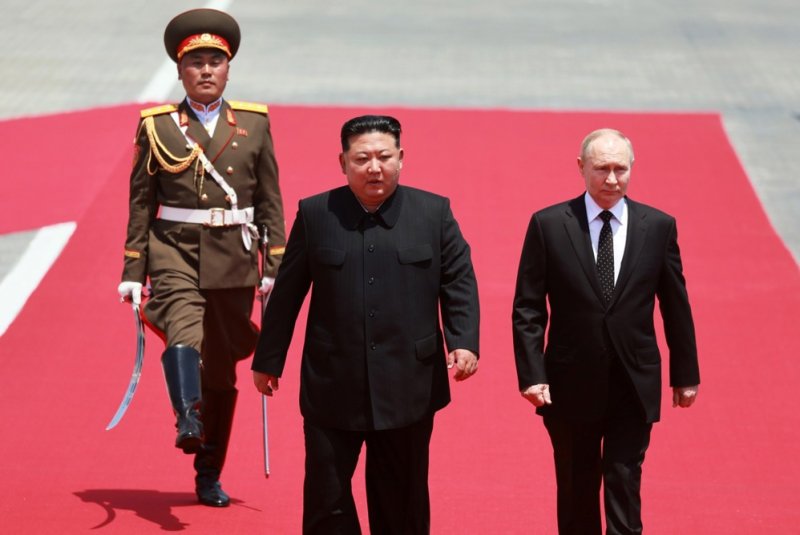Russian President Vladimir Putin (R) and North Korean leader Kim Jong Un attend an official welcoming ceremony during their meeting in Pyongyang, North Korea, on June 19 as the two nations increasingly provide mutual military support that U.S. and Japanese officials view as a challenge to regional and global peace. File Photo by Gavriil Grigorov/Sputnik/Kremlin Pool/EPA-EFE
Dec. 12 (UPI) — Increasingly hostile rhetoric involving the potential use of nuclear weapons has U.S. and Japanese delegations pledging continued deterrence in East Asia.
U.S. and Japanese delegations met in Japan Tuesday through Thursday to share their respective assessments of challenges to regional security and to sustain and extend the two nations’ alliance and efforts to deter military actions by other nations.
The challenges discussed include Russia’s invasion of Ukraine and threatening to use nuclear weapons if Ukraine targets Russian cities with intercontinental ballistic missiles carrying conventional warheads.
Russian President Vladimir Putin in September declared any use of U.S.-supplied ballistic missiles carrying conventional warheads by Ukraine against targets inside Russia would be considered a joint attack.
In such an event, Putin said Russia’s newly revised nuclear doctrine supports the use of nuclear weapons. Russian officials revised that nation’s nuclear doctrine after President Joe Biden lifted prior restrictions on Ukraine using ICBMs against targets deep inside Russia.
North Korea‘s continued development of long-range missiles and pursuit of nuclear weapons also raises concerns.
North Korea in January launched a solid-fuel ballistic missile that contained a maneuverable hypersonic warhead and traveled some 310 miles before landing in the Sea of Japan.
North Korean officials declared the test a success and said the purpose was to verify the reliability of a multi-stage, high-thrust and solid-fuel rocket engines in missiles and the capability to maneuver hypersonic warheads.
China also continues raising regional concerns with its disputed claims on the South China Sea and Taiwan while working to expand its nuclear arsenal and hypersonic missile technology.
Chinese ships have repeatedly been accused of harassing Philippine vessels in the South China Sea, including earlier this month. In August, Beijing ships rammed two vessels owned and operated by the Philippines in that region.
Chinese officials also have laid claims to Taiwan as part of China’s sovereign state and warned against other nations, including the United States, defending Taiwan if China militarily enforced its claim on the the self-governing democratic island nation.
The U.S. and Japanese delegates agreed to continue enhancing their mutual extended deterrence efforts to preserve regional peace and defend against potential attacks while deterring the use of nuclear arms.
The discussions included potential courses of actions during crisis situations and tabletop exercises to increase their mutual understanding during various scenarios.
Representing the United States during the three-day diplomatic event in Japan were Deputy Assistant Secretary for the Bureau of Arms Control, Deterrence and Stability Alexandra Bell of the State Department and Deputy Assistant Secretary of Defense for Nuclear and Countering Weapons of Mass Destruction Policy Richard Johnson of the Defense Department.
Japan’s delegation included Deputy Director-General,North American Affairs Bureau, Ministry of Foreign Affairs Kumagai Naoki and Deputy Director-General, Defense Policy Bureau, Ministry of Defense Ueda Koji.
Other participants included experts in arms control and security policy for both nations.
